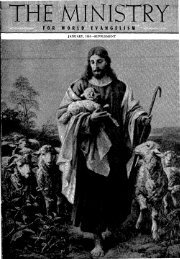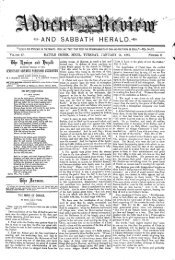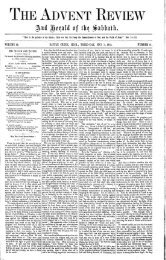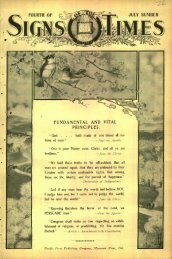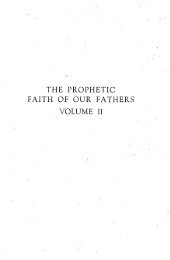- Page 1: YEARBOOK A Directory of The General
- Page 6 and 7: Num. 14:34; Eze. 4:6. 15. That Cod,
- Page 8 and 9: 8 SEVENTH-DAY ADVENTIST YEARBOOK, 1
- Page 10 and 11: 10 SEVENTH-DAY ADVENTIST YEARBOOK,
- Page 12: 12 SEVENTH-DAY ADVENTIST YEARBOOK,
- Page 16 and 17: 16 SEVENTH-DAY ADVENTIST YEARBOOK,
- Page 18 and 19: 18 SEVENTH-DAY ADVENTIST YEARBOOK,
- Page 20 and 21: 20 SEVENTH-DAY ADVENTIST YEARBOOK,
- Page 22 and 23: 22 SEVENTH-DAY ADVENTIST YEARBOOK,
- Page 24 and 25: 24 SEVENTH-DAY ADVENTIST YEARBOOK,
- Page 26 and 27: 26 SEVENTH-DAY ADVENTIST YEARBOOK,
- Page 28 and 29: 28 SEVENTH-DAY ADVENTIST YEARBOOK,
- Page 30 and 31: 30 SEVENTH-DAY ADVENTIST YEARBOOK,
- Page 32 and 33: 32 SEVENTH-DAY ADVENTIST YEARBOOK,
- Page 34 and 35: 34 SEVENTH-DAY ADVENTIST YEARBOOK,
- Page 36 and 37: 36 SEVENTH-DAY ADVENTIST YEARBOOK,
- Page 38 and 39: 38 SEVENTH-DAY ADVENTIST YEARBOOK,
- Page 40 and 41: 40 SEVENTH-DAY ADVENTIST YEARBOOK,
- Page 42 and 43: 42 SEVENTH-DAY ADVENTIST YEARBOOK,
- Page 44 and 45: 44 SEVENTH-DAY ADVENTIST YEARBOOK,
- Page 46 and 47: 46 SEVENTH-DAY ADVENTIST YEARBOOK,
- Page 48 and 49: 48 SEVENTH-DAY ADVENTIST YEARBOOK,
- Page 50 and 51: 50 SEVENTH-DAY ADVENTIST YEARBOOK,
- Page 52 and 53: 52 SEVENTH-DAY ADVENTIST YEARBOOK,
- Page 54 and 55:
54 SEVENTH-DAY ADVENTIST YEARBOOK,
- Page 56 and 57:
56 SEVENTH-DAY ADVENTIST YEARBOOK,
- Page 58 and 59:
58 SEVENTH-DAY ADVENTIST YEARBOOK,
- Page 60 and 61:
60 SEVENTH-DAY ADVENTIST YEARBOOK,
- Page 62 and 63:
62 SEVENTH-DAY ADVENTIST YEARBOOK,
- Page 64 and 65:
64 SEVENTH-DAY ADVENTIST YEARBOOK,
- Page 66 and 67:
66 SEVENTH-DAY ADVENTIST YEARBOOK,
- Page 68 and 69:
68 SEVENTH-DAY ADVENTIST YEARBOOK,
- Page 70 and 71:
70 SEVENTH-DAY ADVENTIST YEARBOOK,
- Page 72 and 73:
72 SEVENTH-DAY ADVENTIST YEARBOOK,
- Page 74 and 75:
74 SEVENTH-DAY ADVENTIST YEARBOOK,
- Page 76 and 77:
76 SEVENTH-DAY ADVENTIST YEARBOOK,
- Page 78 and 79:
78 SEVENTH-DAY ADVENTIST YEARBOOK,
- Page 80 and 81:
.80 SEVENTH-DAY ADVENTIST YEARBOOK,
- Page 82 and 83:
82 SEVENTH-DAY ADVENTIST YEARBOOK,
- Page 84 and 85:
84 Brockett, H. N. Brodersen, G. C.
- Page 86 and 87:
86 D. R. Keele, Mrs. Kathryn Klein,
- Page 88 and 89:
88 SEVENTH-DAY ADVENT1ST YEARBOOK,
- Page 90 and 91:
90 SEVENTH-DAY ADVENTIST YEARBOOK,
- Page 92 and 93:
92 SEVENTH-DAY ADVENTIST YEARBOOK,
- Page 94 and 95:
94 SEVENTH-DAY ADVENTIST YEARBOOK,
- Page 96 and 97:
96 SEVENTH-DAY ADVENTIST YEARBOOK,
- Page 98 and 99:
98 SEVENTH-DAY ADVENTIST YEARBOOK,
- Page 100 and 101:
100 Administration: President, H. J
- Page 102 and 103:
102 SEVENTH-DAY ADVENTIST YEARBOOK,
- Page 104 and 105:
104 SEVENTH-DAY ADVENTIST YEARBOOK,
- Page 106 and 107:
106 SEVENTH-DAY ADVENTIST YEARBOOK,
- Page 108 and 109:
108 SEVENTH-DAY ADVENTIST YEARBOOK,
- Page 110 and 111:
110 SEVENTH-DAY ADVENTIST YEARBOOK,
- Page 112 and 113:
112 SEVENTH-DAY ADVENTIST YEARBOOK,
- Page 114 and 115:
114 SEVENTH-DAY ADVENTIST YEARBOOK,
- Page 116 and 117:
116 SEVENTH-DAY ADVENTIST YEARBOOK,
- Page 118 and 119:
118 SEVENTH-DAY ADVENTIST YEARBOOK,
- Page 120 and 121:
120 SEVENTH-DAY ADVENTIST YEARBOOK,
- Page 122 and 123:
122 SEVENTH-DAY ADVENTIST YEARBOOK,
- Page 124 and 125:
•\ GILBERT AND ELLICE ISLANDS ISL
- Page 126 and 127:
126 SEVENTH-DAY ADVENTIST YEARBOOK,
- Page 128 and 129:
128 SEVENTH-DAY ADVENTIST YEARBOOK,
- Page 130 and 131:
130 SEVENTH-DAY ADVENTIST YEARBOOK,
- Page 132 and 133:
132 SEVENTH-DAY ADVENTIST YEARBOOK,
- Page 134 and 135:
134 SEVENTH-DAY ADVENTIST YEARBOOK,
- Page 136 and 137:
136 SEVENTH-DAY ADVENTIST YEARBOOK,
- Page 138 and 139:
138 SEVENTH-DAY ADVENTIST YEARBOOK,
- Page 140 and 141:
140 SEVENTH-DAY ADVENTIST YEARBOOK,
- Page 142 and 143:
142 SEVENTH-DAY ADVENTIST YEARBOOK,
- Page 144 and 145:
144 SEVENTH-DAY ADVENTIST YEARBOOK,
- Page 146 and 147:
146 Atlantic Ocean FRANCO-BELGIAN U
- Page 148 and 149:
148 SEVENTH-DAY ADVENTIST YEARBOOK,
- Page 150 and 151:
150 SEVENTH-DAY ADVENTIST YEARBOOK,
- Page 152 and 153:
152 SEVENTH-DAY ADVENTIST YEARBOOK,
- Page 154 and 155:
154 SEVENTH-DAY ADVENTIST YEARBOOK,
- Page 156 and 157:
156 SEVENTH-DAY ADVENTIST YEARBOOK,
- Page 158 and 159:
158 SEVENTH-DAY ADVENTIST YEARBOOK,
- Page 160 and 161:
160 SEVENTH-DAY ADVEISITIST YEARBOO
- Page 162 and 163:
162 SEVENTH-DAY ADVENTIST YEARBOOK,
- Page 164 and 165:
164 SEVENTH-DAY ADVENTIST YEARBOOK,
- Page 166 and 167:
166 SEVENTH-DAY ADVENTIST YEARBOOK,
- Page 168 and 169:
168 SEVENTH-DAY ADVENTIST YEARBOOK,
- Page 170 and 171:
170 SEVENTH-DAY ADVENTIST YEARBOOK,
- Page 172 and 173:
172 SEVENTH-DAY ADVENTIST YEARBOOK,
- Page 174 and 175:
174 SEVENTH-DAY ADVENTIST YEARBOOK,
- Page 176:
176 SEVENTH-DAY ADVENTIST YEARBOOK,
- Page 179 and 180:
FAR EASTERN DIVISION Territory: Bor
- Page 181 and 182:
do, S. Y. Javellana, A. T. Luna, D.
- Page 183 and 184:
Ordained Ministers: A. J. Ander, Ha
- Page 185 and 186:
F. Montolalu, H. Pasuhuk, E. Saeran
- Page 187 and 188:
Population: 37,018,996; churches, 3
- Page 189 and 190:
Lay Activities, Communication and S
- Page 191 and 192:
Elorta, Eleanor J. Escalaw, D. L. E
- Page 193 and 194:
Lorenzo Ojoylan, Abner Olit, Edgar
- Page 195 and 196:
C. A. Alcaide, A. L. Barcoma, A. Co
- Page 197 and 198:
Administration: President, M. Y. Hs
- Page 199 and 200:
Ministerial and Communication, F. C
- Page 201 and 202:
Malaysia-Singapore Missions. Popula
- Page 203 and 204:
Jaiguar, Mun Lansri, Veerachai Mopk
- Page 205 and 206:
matupang, M. Sinaga, T. Sinaga, D.
- Page 207 and 208:
Manafe, B. Mangi, L. M. Manudibu, M
- Page 209 and 210:
Nusa Tenggara Academy, Jalan Kosasi
- Page 212 and 213:
UNITED STATES INTER-AMERICAN DIVISI
- Page 214 and 215:
214 SEVENTH-DAY ADVENTIST YEARBOOK,
- Page 216 and 217:
216 SEVENTH-DAY ADVENTIST YEARBOOK,
- Page 218 and 219:
218 SEVENTH-DAY ADVENTIST YEARBOOK,
- Page 220 and 221:
220 SEVENTH-DAY ADVENTIST YEARBOOK,
- Page 222 and 223:
222 SEVENTH-DAY ADVENTIST YEARBOOK,
- Page 224 and 225:
224 SEVENTH-DAY ADVENTIST YEARBOOK,
- Page 226 and 227:
226 SEVENTH-DAY ADVENTIST YEARBOOK,
- Page 228 and 229:
228 SEVENTH-DAY ADVENTIST YEARBOOK,
- Page 230 and 231:
230 SEVENTH-DAY ADVENTIST YEARBOOK,
- Page 232 and 233:
232 SEVENTH-DAY ADVENTIST YEARBOOK,
- Page 234 and 235:
234 SEVENTH-DAY ADVENTIST YEARBOOK,
- Page 236 and 237:
236 SEVENTH-DAY ADVENTIST YEARBOOK,
- Page 238 and 239:
238 SEVENTH-DAY ADVENTIST YEARBOOK,
- Page 240 and 241:
240 SEVENTH-DAY ADVENTIST YEARBOOK,
- Page 242 and 243:
242 SEVENTH-DAY ADVENTIST YEARBOOK,
- Page 244 and 245:
244 SEVENTH-DAY ADVENTIST YEARBOOK,
- Page 246 and 247:
246 SEVENTH-DAY ADVENTIST YEARBOOK,
- Page 248 and 249:
248 SEVENTH-DAY ADVENTIST YEARBOOK,
- Page 250 and 251:
250 SEVENTH-DAY ADVENTIST YEARBOOK,
- Page 252 and 253:
252 SEVENTH-DAY ADVENTIST YEARBOOK,
- Page 254 and 255:
254 SEVENTH-DAY ADVENTIST YEARBOOK,
- Page 256:
256 SEVENTH-DAY ADVENTIST YEARBOOK,
- Page 259 and 260:
SOUTH AMERICAN DIVISION Territory:
- Page 261 and 262:
Mrs. Nancy Cordienko, Ada Craf, Aro
- Page 263 and 264:
Credentialed Literature Evangelists
- Page 265 and 266:
Licensed Ministers: Luis Araya, Hec
- Page 267 and 268:
BAHIA-SERGIPE MISSION Established 1
- Page 269 and 270:
Janete Burlandy, Sonia Dutra Carval
- Page 271 and 272:
Postal Address: Cajon Postal 2495,
- Page 273 and 274:
Credentialed Literature Evangelists
- Page 275 and 276:
Postal Address: Caixa Postal 341, 6
- Page 277 and 278:
O. Milane, J. M. Oliveira, Mrs. J.
- Page 279 and 280:
Fonseca, Mrs. C. O. Fortes, A. O. C
- Page 281 and 282:
SOUTH AMERICAN DIVISION 281 INSTITU
- Page 283 and 284:
SOUTH AMERICAN DIVISION 283 Branch
- Page 285 and 286:
SOUTHERN ASIA DIVISION Territory: A
- Page 287 and 288:
Territory: Burma; comprising the Ce
- Page 289 and 290:
Departmental Directors: Communicati
- Page 291 and 292:
Licensed Missionaries: Mrs. C. Abso
- Page 293 and 294:
Piperson Marak, Imbung Mono, R. Mos
- Page 295 and 296:
Treasurer, P. T. Johnkutty. Executi
- Page 297 and 298:
son, D. M. David, A. Devadas, lyadu
- Page 299 and 300:
Kottarakara High School Dispensary,
- Page 301 and 302:
TRANS-AFRICA DIVISION Territory: Bo
- Page 303 and 304:
Postal Address: Boite Postale 1, Ny
- Page 305 and 306:
Nzaramba, Samuel Rwalinda, Stefano
- Page 307 and 308:
C. du Plooy, W. L. Grobler, D. Hone
- Page 309 and 310:
tharina Scrooby, Mrs. C. H. van Wyk
- Page 311 and 312:
Telex Number: 8-0431. Office Addres
- Page 313 and 314:
Credentialed Missionaries: Isabel B
- Page 315 and 316:
SOUTH SHABA FIELD Organized 1974 Te
- Page 317 and 318:
Population: 26,000; churches, 10; m
- Page 319 and 320:
Office Address: Monze, Zambia, Afri
- Page 321:
Publishing Malamulo Publishing Hous
- Page 324 and 325:
324 SEVENTH-DAY ADVENTIST YEARBOOK,
- Page 326 and 327:
326 SEVENTH-DAY ADVENTIST YEARBOOK,
- Page 328 and 329:
328 SEVENTH-DAY ADVENTIST YEARBOOK,
- Page 330 and 331:
330 SEVENTH-DAY ADVENTIST YEARBOOK,
- Page 332 and 333:
332 SEVENTH-DAY ADVENTIST YEARBOOK,
- Page 334 and 335:
334 SEVENTH-DAY ADVENTIST YEARBOOK,
- Page 336 and 337:
336 Elementary School Staff: Princi
- Page 338 and 339:
338 SEVENTH-DAY ADVENTIST YEARBOOK,
- Page 340 and 341:
340 SEVENTH-DAY ADVENTIST YEARBOOK,
- Page 342 and 343:
342 SEVENTH-DAY ADVENTIST YEARBOOK,
- Page 344 and 345:
344 SEVENTH-DAY ADVENTIST YEARBOOK,
- Page 346 and 347:
346 SEVENTH-DAY ADVENTIST YEARBOOK,
- Page 348 and 349:
348 SEVENTH-DAY ADVENTIST YEARBOOK,
- Page 350 and 351:
350 SEVENTH-DAY ADVENTIST YEARBOOK,
- Page 352 and 353:
352 SEVENTH-DAY ADVENTIST YEARBOOK,
- Page 354 and 355:
354 SEVENTH-DAY ADVENTIST YEARBOOK,
- Page 356 and 357:
356 SEVENTH-DAY ADVENTIST YEARBOOK,
- Page 358 and 359:
358 SEVENTH-DAY ADVENTIST YEARBOOK,
- Page 360 and 361:
360 SEVENTH-DAY ADVENTIST YEARBOOK,
- Page 362 and 363:
362 SEVENTH-DAY ADVENTIST YEARBOOK,
- Page 364 and 365:
364 SEVENTH-DAY ADVENTIST YEARBOOK,
- Page 366 and 367:
366 Religion, Dick Donaldson, Milfo
- Page 368 and 369:
368 SEVENTH-DAY ADVENTIST YEARBOOK,
- Page 370 and 371:
370 SEVENTH-DAY ADVENTIST YEARBOOK,
- Page 372 and 373:
372 SEVENTH-DAY ADVENTIST YEARBOOK,
- Page 374 and 375:
374 SEVENTH-DAY ADVENTIST YEARBOOK,
- Page 376 and 377:
376 SEVENTH-DAY ADVENT1ST YEARBOOK,
- Page 378 and 379:
378 SEVENTH-DAY ADVENTIST YEARBOOK,
- Page 380 and 381:
380 Business Manager, Elmer Lampson
- Page 382 and 383:
382 SEVENTH-DAY ADVENTIST YEARBOOK,
- Page 384 and 385:
384 SEVENTH-DAY ADVENTIST YEARBOOK,
- Page 386 and 387:
386 SEVENTH-DAY ADVENTIST YEARBOOK,
- Page 388 and 389:
388 SEVENTH-DAY ADVENTIST YEARBOOK,
- Page 390 and 391:
390 SEVENTH-DAY ADVENTIST YEARBOOK,
- Page 392 and 393:
392 SEVENTH-DAY ADVENTIST YEARBOOK,
- Page 394 and 395:
394 SEVENTH-DAY ADVENTIST YEARBOOK,
- Page 396 and 397:
396 SEVENTH-DAY ADVENTIST YEARBOOK,
- Page 398 and 399:
398 SEVENTH-DAY ADVENTIST YEARBOOK,
- Page 400 and 401:
400 SEVENTH-DAY ADVENTIST YEARBOOK,
- Page 402 and 403:
402 Elementary School: Jack Babshaw
- Page 404 and 405:
404 SEVENTH-DAY ADVENTIST YEARBOOK,
- Page 406 and 407:
406 SEVENTH-DAY ADVENTIST YEARBOOK,
- Page 408 and 409:
408 SEVENTH-DAY ADVENTIST YEARBOOK,
- Page 410 and 411:
410 SEVENTH-DAY ADVENTIST YEARBOOK,
- Page 412 and 413:
412 SEVENTH-DAY ADVENTIST YEARBOOK,
- Page 414 and 415:
414 SEVENTH-DAY ADVENTIST YEARBOOK,
- Page 416 and 417:
416 SEVENTH-DAY ADVENTIST YEARBOOK,
- Page 418 and 419:
418 SEVENTH-DAY ADVENTIST YEARBOOK,
- Page 420 and 421:
420 SEVENTH-DAY ADVENTIST YEARBOOK,
- Page 422 and 423:
422 SEVENTH-DAY ADVENTIST YEARBOOK,
- Page 424 and 425:
424 SEVENTH-DAY ADVENTIST YEARBOOK,
- Page 426 and 427:
426 SEVENTH-DAY ADVENTIST YEARBOOK,
- Page 428 and 429:
428 SEVENTH-DAY ADVENTIST YEARBOOK,
- Page 430 and 431:
430 SEVENTH-DAY ADVENTIST YEARBOOK,
- Page 432 and 433:
432 SEVENTH-DAY ADVENTIST YEARBOOK,
- Page 434 and 435:
434 SEVENTH-DAY ADVENTIST YEARBOOK,
- Page 436 and 437:
436 SEVENTH-DAY ADVENTIST YEARBOOK,
- Page 438 and 439:
438 SEVENTH-DAY ADVENTIST YEARBOOK,
- Page 440 and 441:
440 SEVENTH-DAY ADVENTIST YEARBOOK,
- Page 442 and 443:
442 SEVENTH-DAY ADVENTIST YEARBOOK,
- Page 444 and 445:
444 SEVENTH-DAY ADVENTIST YEARBOOK,
- Page 446 and 447:
446 SEVENTH-DAY ADVEMTIST YEARBOOK,
- Page 448 and 449:
448 SEVENTH-DAY ADVENTIST YEARBOOK,
- Page 450 and 451:
450 SEVENTH-DAY ADVENTIST YEARBOOK,
- Page 452 and 453:
452 SEVENTH-DAY ADVENTIST YEARBOOK,
- Page 454 and 455:
454 SEVENTH-DAY ADVENTIST YEARBOOK,
- Page 456 and 457:
456 SEVENTH-DAY ADVENTIST YEARBOOK,
- Page 458 and 459:
458 SEVENTH-DAY ADVENTIST YEARBOOK,
- Page 460 and 461:
460 SEVENTH-DAY ADVENTIST YEARBOOK,
- Page 462 and 463:
462 SEVENTH-DAY ADVENTIST YEARBOOK,
- Page 464 and 465:
464 SEVENTH-DAY ADVENTIST YEARBOOK,
- Page 466 and 467:
466 SEVENTH-DAY ADVENTIST YEARBOOK,
- Page 468 and 469:
468 SEVENTH-DAY ADVENTIST YEARBOOK,
- Page 470 and 471:
470 SEVENTH-DAY ADVENTIST YEARBOOK,
- Page 472 and 473:
472 SEVENTH-DAY ADVENTIST YEARBOOK,
- Page 474 and 475:
474 SEVENTH-DAY ADVENTIST YEARBOOK,
- Page 476 and 477:
476 SEVENTH-DAY ADVENTIST YEARBOOK,
- Page 478 and 479:
478 SEVENTH-DAY ADVENTIST YEARBOOK,
- Page 480 and 481:
480 SEVENTH-DAY ADVENTIST YEARBOOK,
- Page 482 and 483:
482 SEVENTH-DAY ADVENTIST YEARBOOK,
- Page 484 and 485:
484 SEVENTH-DAY ADVENTIST YEARBOOK,
- Page 486 and 487:
486 SEVENTH-DAY ADVENTIST YEARBOOK,
- Page 488 and 489:
488 SEVENTH-DAY ADVENTIST YEARBOOK,
- Page 490 and 491:
490 SEVENTH-DAY ADVENTIST YEARBOOK,
- Page 492 and 493:
492 SEVENTH-DAY ADVENTIST YEARBOOK,
- Page 494 and 495:
494 SEVENTH-DAY ADVENTIST YEARBOOK,
- Page 496 and 497:
496 SEVENTH-DAY ADVENTIST YEARBOOK,
- Page 498 and 499:
498 SEVENTH-DAY ADVENTIST YEARBOOK,
- Page 500 and 501:
500 SEVENTH-DAY ADVENTIST YEARBOOK,
- Page 502 and 503:
NECROIOGY—1977-1978 "They rest fr
- Page 504 and 505:
Perkins, Howard Ellis, December 24,
- Page 506 and 507:
506 SEVENTH-DAY ADVENTIST YEARBOOK,
- Page 508 and 509:
508 SEVENTH-DAY ADVENTIST YEARBOOK,
- Page 510 and 511:
510 SEVENTH-DAY ADVENTIST YEARBOOK,
- Page 512 and 513:
512 SEVENTH-DAY ADVENTIST YEARBOOK,
- Page 514 and 515:
514 SEVENTH-DAY ADVENTIST YEARBOOK,
- Page 516 and 517:
516 SEVENTH-DAY ADVENTIST YEARBOOK,
- Page 518 and 519:
518 SEVENTH-DAY ADVENTIST YEARBOOK,
- Page 520 and 521:
520 SEVENTH-DAY ADVENTIST YEARBOOK,
- Page 522 and 523:
522 SEVENTH-DAY ADVENTIST YEARBOOK,
- Page 524 and 525:
524 SEVENTH-DAY ADVENTIST YEARBOOK,
- Page 526 and 527:
526 SEVENTH-DAY ADVENTIST YEARBOOK,
- Page 528 and 529:
528 SEVENTH-DAY ADVENTIST YEARBOOK,
- Page 530 and 531:
530 SEVENTH-DAY ADVENTIST YEARBOOK,
- Page 532 and 533:
532 SEVENTH-DAY ADVENTIST YEARBOOK,
- Page 534 and 535:
534 SEVENTH-DAY ADVENTIST YEARBOOK,
- Page 536 and 537:
536 SEVENTH-DAY ADVENTIST YEARBOOK,
- Page 538 and 539:
538 SEVENTH-DAY ADVENTIST YEARBOOK,
- Page 540 and 541:
540 SEVENTH-DAY ADVENTIST YEARBOOK,
- Page 542 and 543:
542 SEVENTH-DAY ADVENTIST YEARBOOK,
- Page 544 and 545:
544 SEVENTH-DAY ADVENTIST YEARBOOK,
- Page 546 and 547:
546 SEVENTH-DAY ADVENTIST YEARBOOK,
- Page 548 and 549:
548 SEVENTH-DAY ADVENTIST YEARBOOK,
- Page 550 and 551:
550 SEVENTH-DAY ADVENTIST YEARBOOK,
- Page 552 and 553:
552 SEVENTH-DAY ADVENTIST YEARBOOK,
- Page 554 and 555:
554 SEVENTH-DAY ADVENTIST YEARBOOK,
- Page 556 and 557:
556 SEVENTH-DAY ADVENTIST YEARBOOK,
- Page 558 and 559:
558 SEVENTH-DAY ADVENTIST YEARBOOK,
- Page 560 and 561:
560 SEVENTH-DAY ADVENTIST YEARBOOK,
- Page 562 and 563:
562 SEVENTH-DAY ADVENTIST YEARBOOK,
- Page 564 and 565:
564 SEVENTH-DAY ADVENTIST YEARBOOK,
- Page 566 and 567:
566 SEVENTH-DAY ADVENTIST YEARBOOK,
- Page 568 and 569:
568 SEVENTH-DAY ADVENTIST YEARBOOK,
- Page 570 and 571:
570 SEVENTH-DAY ADVENTIST YEARBOOK,
- Page 572 and 573:
572 SEVENTH-DAY ADVENTIST YEARBOOK,
- Page 574 and 575:
574 SEVENTH-DAY ADVENTIST YEARBOOK,
- Page 576 and 577:
576 SEVENTH-DAY ADVENTIST YEARBOOK,
- Page 578 and 579:
578 SEVENTH-DAY ADVENTIST YEARBOOK,
- Page 580 and 581:
580 SEVENTH-DAY ADVENTIST YEARBOOK,
- Page 582 and 583:
ABBREVIATIONS (United States and Ca
- Page 584 and 585:
584 SEVENTH-DAY ADVENTIST YEARBOOK,
- Page 586 and 587:
586 SEVENTH-DAY ADVENTIST YEARBOOK,
- Page 588 and 589:
588 SEVENTH-DAY ADVENTIST YEARBOOK,
- Page 590 and 591:
590 SEVENTH-DAY ADVENTIST YEARBOOK,
- Page 592 and 593:
592 SEVENTH-DAY ADVENTIST YEARBOOK,
- Page 594 and 595:
594 SEVENTH-DAY ADVENTIST YEARBOOK,
- Page 596 and 597:
596 SEVENTH-DAY ADVENTIST YEARBOOK,
- Page 598 and 599:
598 SEVENTH-DAY ADVENT1ST YEARBOOK,
- Page 600 and 601:
600 SEVENTH-DAY ADVENTIST YEARBOOK,
- Page 602 and 603:
602 SEVENTH-DAY ADVENTIST YEARBOOK,
- Page 604 and 605:
604 SEVENTH-DAY ADVENTIST YEARBOOK,
- Page 606 and 607:
606 SEVENTH-DAY ADVENTIST YEARBOOK,
- Page 608 and 609:
608 SEVENTH-DAY ADVENTIST YEARBOOK,
- Page 610 and 611:
610 SEVENTH-DAY ADVENTIST YEARBOOK,
- Page 612 and 613:
612 SEVENTH-DAY ADVENTIST YEARBOOK,
- Page 614 and 615:
614 SEVENTH-DAY ADVENTIST YEARBOOK,
- Page 616 and 617:
616 SEVENTH-DAY ADVENTIST YEARBOOK,
- Page 618 and 619:
618 SEVENTH-DAY ADVENTIST YEARBOOK,
- Page 620 and 621:
620 SEVENTH-DAY ADVENTIST YEARBOOK,
- Page 622 and 623:
622 SEVENTH-DAY ADVENTIST YEARBOOK,
- Page 624 and 625:
624 SEVENTH-DAY ADVENTIST YEARBOOK,
- Page 626 and 627:
626 SEVENTH-DAY ADVENTIST YEARBOOK,
- Page 628 and 629:
628 SEVENTH-DAY ADVENTIST YEARBOOK,
- Page 630 and 631:
630 SEVENTH-DAY ADVENTIST YEARBOOK,
- Page 632 and 633:
632 SEVENTH-DAY ADVENTIST YEARBOOK,
- Page 634 and 635:
634 SEVENTH-DAY ADVENTIST YEARBOOK,
- Page 636 and 637:
636 SEVENTH-DAY ADVENTIST YEARBOOK,
- Page 638 and 639:
638 SEVENTH-DAY ADVENTIST YEARBOOK,
- Page 640 and 641:
640 SEVENTH-DAY ADVENTIST YEARBOOK,
- Page 642 and 643:
642 SEVENTH-DAY ADVENTIST YEARBOOK,
- Page 644 and 645:
644 SEVENTH-DAY ADVENTIST YEARBOOK,
- Page 646 and 647:
646 SEVENTH-DAY ADVENTIST YEARBOOK,
- Page 648 and 649:
648 SEVENTH-DAY ADVENTIST YEARBOOK,
- Page 650 and 651:
650 SEVENTH-DAY ADVENTIST YEARBOOK,
- Page 652 and 653:
652 SEVENTH-DAY ADVENTIST YEARBOOK,
- Page 654 and 655:
654 SEVENTH-DAY ADVENTIST YEARBOOK,
- Page 656 and 657:
656 SEVENTH-DAY ADVENTIST YEARBOOK,
- Page 658 and 659:
658 SEVENTH-DAY ADVENTIST YEARBOOK,
- Page 660 and 661:
660 SEVENTH-DAY ADVENT1ST YEARBOOK,
- Page 662 and 663:
662 SEVENTH-DAY ADVENTIST YEARBOOK,
- Page 664 and 665:
664 SEVENTH-DAY ADVENTIST YEARBOOK,
- Page 666 and 667:
666 SEVENTH-DAY ADVENTIST YEARBOOK,
- Page 668 and 669:
668 SEVENTH-DAY ADVENTIST YEARBOOK,
- Page 670 and 671:
670 SEVENTH-DAY ADVENTIST YEARBOOK,
- Page 672 and 673:
672 SEVENTH-DAY ADVENTIST YEARBOOK,
- Page 674 and 675:
674 SEVENTH-DAY ADVENTIST YEARBOOK,
- Page 676 and 677:
676 SEVENTH-DAY ADVENTIST YEARBOOK,
- Page 678 and 679:
678 SEVENTH-DAY ADVENTIST YEARBOOK,
- Page 680 and 681:
680 SEVENTH-DAY ADVENTIST YEARBOOK,
- Page 682 and 683:
682 SEVENTH-DAY ADVENTIST YEARBOOK,
- Page 684 and 685:
684 SEVENTH-DAY ADVENTIST YEARBOOK,
- Page 686 and 687:
686 SEVENTH-DAY ADVENTIST YEARBOOK,
- Page 688 and 689:
688 SEVENTH-DAY ADVENTIST YEARBOOK,
- Page 690 and 691:
690 SEVENTH-DAY ADVENTIST YEARBOOK,
- Page 692 and 693:
692 SEVENTH-DAY ADVENTIST YEARBOOK,
- Page 694 and 695:
694 SEVENTH-DAY ADVENTIST YEARBOOK,
- Page 696 and 697:
696 SEVENTH-DAY ADVENTIST YEARBOOK,
- Page 698 and 699:
698 SEVENTH-DAY ADVENTIST YEARBOOK,
- Page 700 and 701:
700 SEVENTH-DAY ADVENT1ST YEARBOOK,
- Page 702 and 703:
702 SEVENTH-DAY ADVENTIST YEARBOOK,
- Page 704 and 705:
704 SEVENTH-DAY ADVENTIST YEARBOOK,
- Page 706 and 707:
706 SEVENTH-DAY ADVENTIST YEARBOOK,
- Page 708 and 709:
708 SEVENTH-DAY ADVENTIST YEARBOOK,
- Page 710 and 711:
710 SEVENTH-DAY ADVENTIST YEARBOOK,
- Page 712 and 713:
712 SEVENTH-DAY ADVENTIST YEARBOOK,
- Page 714 and 715:
714 SEVENTH-DAY ADVENTIST YEARBOOK,
- Page 716 and 717:
716 SEVENTH-DAY ADVENTIST YEARBOOK,
- Page 718 and 719:
718 SEVENTH-DAY ADVENTIST YEARBOOK,
- Page 720 and 721:
720 SEVENTH-DAY ADVENTIST YEARBOOK,
- Page 722 and 723:
722 SEVENTH-DAY ADVENTIST YEARBOOK,
- Page 724 and 725:
724 SEVENTH-DAY ADVENTIST YEARBOOK,
- Page 726 and 727:
726 SEVENTH-DAY ADVENTIST YEARBOOK,
- Page 728 and 729:
728 SEVENTH-DAY ADVENTIST YEARBOOK,
- Page 730 and 731:
730 SEVENTH-DAY ADVENTIST YEARBOOK,
- Page 732 and 733:
732 SEVENTH-DAY ADVENTIST YEARBOOK,
- Page 734 and 735:
734 SEVENTH-DAY ADVENTIST YEARBOOK,
- Page 736 and 737:
736 SEVENTH-DAY ADVENTIST YEARBOOK,
- Page 738 and 739:
738 SEVENTH-DAY ADVENTIST YEARBOOK,
- Page 740 and 741:
740 SEVENTH-DAY ADVENTIST YEARBOOK,
- Page 742 and 743:
742 SEVENTH-DAY ADVENTIST YEARBOOK,
- Page 744 and 745:
744 SEVENTH-DAY ADVENTIST YEARBOOK,
- Page 746 and 747:
746 SEVENTH-DAY ADVENTIST YEARBOOK,
- Page 748 and 749:
748 SEVENTH-DAY ADVENTIST YEARBOOK,
- Page 750 and 751:
750 SEVENTH-DAY ADVENTIST YEARBOOK,
- Page 752 and 753:
752 SEVENTH-DAY ADVENTIST YEARBOOK,
- Page 754 and 755:
754 SEVENTH-DAY ADVENTIST YEARBOOK,
- Page 756 and 757:
756 SEVENTH-DAY ADVENT1ST YEARBOOK,
- Page 758 and 759:
758 SEVENTH-DAY ADVENTIST YEARBOOK,
- Page 760 and 761:
760 SEVENTH-DAY ADVENTIST YEARBOOK,
- Page 762 and 763:
762 SEVENTH-DAY ADVENTIST YEARBOOK,
- Page 764 and 765:
764 SEVENTH-DAY ADVENTIST YEARBOOK,
- Page 766 and 767:
766 SEVENTH-DAY ADVENTIST YEARBOOK,
- Page 768 and 769:
768 SEVENTH-DAY ADVENTIST YEARBOOK,
- Page 770 and 771:
770 SEVENTH-DAY ADVENTIST YEARBOOK,
- Page 772 and 773:
772 SEVENTH-DAY ADVENTIST YEARBOOK,
- Page 774 and 775:
774 SEVENTH-DAY ADVENTIST YEARBOOK,
- Page 776 and 777:
776 SEVENTH-DAY ADVENTIST YEARBOOK,
- Page 778 and 779:
778 SEVENTH-DAY ADVENTIST YEARBOOK,
- Page 780 and 781:
780 SEVENTH-DAY ADVENTIST YEARBOOK,
- Page 782 and 783:
782 SEVENTH-DAY ADVENTIST YEARBOOK,
- Page 784 and 785:
784 SEVENTH-DAY ADVENTIST YEARBOOK,
- Page 786 and 787:
786 SEVENTH-DAY ADVENTIST YEARBOOK,
- Page 788 and 789:
788 SEVENTH-DAY ADVENTIST YEARBOOK,
- Page 790 and 791:
790 SEVENTH-DAY ADVENTIST YEARBOOK,
- Page 792 and 793:
792 SEVENTH-DAY ADVENTIST YEARBOOK,
- Page 794 and 795:
794 SEVENTH-DAY ADVENTIST YEARBOOK,
- Page 796 and 797:
796 SEVENTH-DAY ADVENTIST YEARBOOK,
- Page 798 and 799:
798 SEVENTH-DAY ADVENT1ST YEARBOOK,
- Page 800 and 801:
800 SEVENTH-DAY ADVENTIST YEARBOOK,
- Page 802 and 803:
802 SEVENTH-DAY ADVENTIST YEARBOOK,
- Page 804 and 805:
804 SEVENTH-DAY ADVENTIST YEARBOOK,
- Page 806 and 807:
806 SEVENTH-DAY ADVENTIST YEARBOOK,
- Page 808 and 809:
808 SEVENTH-DAY ADVENTIST YEARBOOK,
- Page 810 and 811:
810 SEVENTH-DAY ADVENTIST YEARBOOK,
- Page 812 and 813:
812 SEVENTH-DAY ADVENTIST YEARBOOK,
- Page 814 and 815:
814 SEVENTH-DAY ADVENTIST YEARBOOK,
- Page 816 and 817:
816 SEVENTH-DAY ADVENTIST YEARBOOK,
- Page 818 and 819:
818 SEVENTH-DAY ADVENT1ST YEARBOOK,
- Page 820 and 821:
820 SEVENTH-DAY ADVENTIST YEARBOOK,
- Page 822 and 823:
822 SEVENTH-DAY ADVENTIST YEARBOOK,
- Page 824 and 825:
824 SEVENTH-DAY ADVENTIST YEARBOOK,
- Page 826 and 827:
826 SEVENTH-DAY ADVENTIST YEARBOOK,
- Page 828 and 829:
828 SEVENTH-DAY ADVENTIST YEARBOOK,
- Page 830 and 831:
830 SEVENTH-DAY ADVENTIST YEARBOOK,
- Page 832 and 833:
832 SEVENTH-DAY ADVENTIST YEARBOOK,
- Page 834 and 835:
834 SEVENTH-DAY ADVENTIST YEARBOOK,
- Page 836 and 837:
836 SEVENTH-DAY ADVENTIST YEARBOOK,
- Page 838 and 839:
838 SEVENTH-DAY ADVENTIST YEARBOOK,
- Page 840 and 841:
840 SEVENTH-DAY ADVENTIST YEARBOOK,
- Page 842 and 843:
842 SEVENTH-DAY ADVENTIST YEARBOOK,
- Page 844 and 845:
844 SEVENTH-DAY ADVENTIST YEARBOOK,
- Page 846 and 847:
846 SEVENTH-DAY ADVENTIST YEARBOOK,
- Page 848 and 849:
848 SEVENTH-DAY ADVENTIST YEARBOOK,
- Page 850 and 851:
850 SEVENTH-DAY ADVENTIST YEARBOOK,
- Page 852 and 853:
852 SEVENTH-DAY ADVENTIST YEARBOOK,
- Page 854 and 855:
S M 1 7 8 14 15 21 22 28 29 S M 4 5
- Page 856 and 857:
CALENDAR OF SPECIAL DAYS AND OFFERI
- Page 858 and 859:
Our Advertisers Effective advertisi
- Page 860 and 861:
860 SEVENTH-DAY ADVENTIST YEARBOOK,
- Page 862 and 863:
862 SEVENTH-DAY ADVENTIST YEARBOOK,
- Page 864 and 865:
864 SEVENTH-DAY ADVENTIST YEARBOOK,
- Page 866 and 867:
866 SEVENTH-DAY ADVENTIST YEARBOOK,
- Page 868 and 869:
868 SEVENTH-DAY ADVENTIST YEARBOOK,
- Page 870:
870 SEVENTH-DAY ADVENTIST YEARBOOK,



